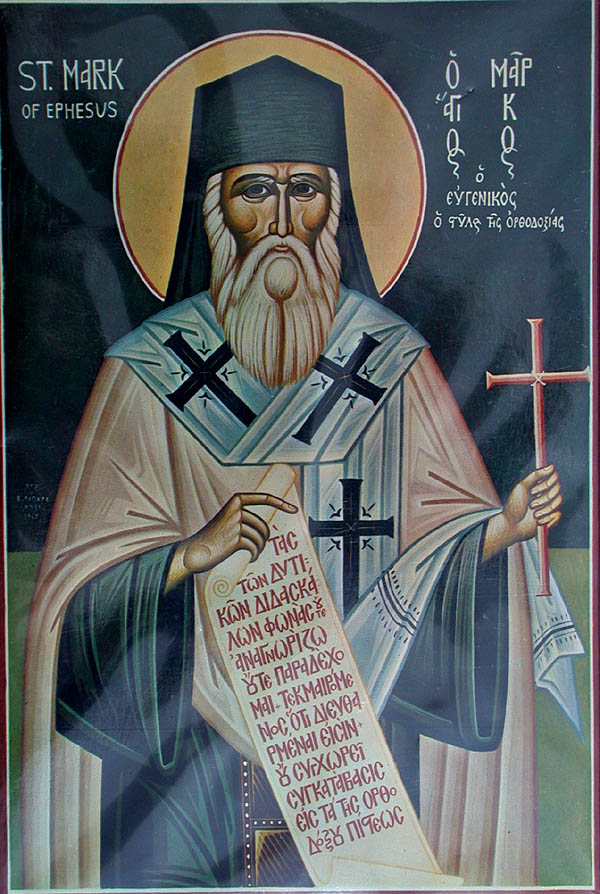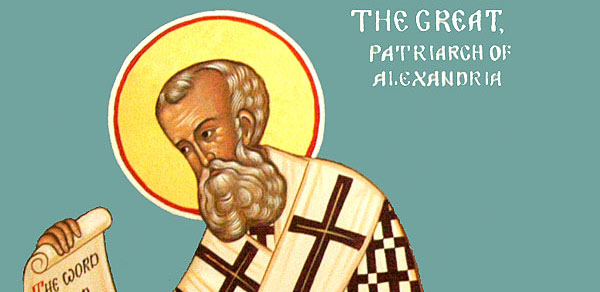Saint Mark, Archbishop of Ephesus
 Saint Mark Eugenikos, Archbishop of Ephesus, was a stalwart defender of Orthodoxy at the Council of Florence. He would not agree to a union with Rome which was based on theological compromise and political expediency (the Byzantine Emperor was seeking military assistance from the West against the Moslems who were drawing ever closer to Constantinople). Saint Mark countered the arguments of his opponents, drawing from the well of pure theology, and the teachings of the holy Fathers. When the members of his own delegation tried to pressure him into accepting the Union he replied, “There can be no compromise in matters of the Orthodox Faith.”
Saint Mark Eugenikos, Archbishop of Ephesus, was a stalwart defender of Orthodoxy at the Council of Florence. He would not agree to a union with Rome which was based on theological compromise and political expediency (the Byzantine Emperor was seeking military assistance from the West against the Moslems who were drawing ever closer to Constantinople). Saint Mark countered the arguments of his opponents, drawing from the well of pure theology, and the teachings of the holy Fathers. When the members of his own delegation tried to pressure him into accepting the Union he replied, “There can be no compromise in matters of the Orthodox Faith.”
Venerable Macarius the Great of Egypt
Saint Macarius the Great of Egypt was born in the early fourth century in the village of Ptinapor in Egypt. At the wish of his parents he entered into marriage, but was soon widowed. After he buried his wife, Macarius told himself, “Take heed, Macarius, and have care for your soul. It is fitting that you forsake worldly life.”
St. Athanasius the Great the Patriarch of Alexandria
 Saint Athanasius the Great, Archbishop of Alexandria, was a great Father of the Church and a pillar of Orthodoxy. He was born around the year 297 in the city of Alexandria into a family of pious Christians. He received a fine secular education, but he acquired more knowledge by diligent study of the Holy Scripture. In his childhood, the future hierarch Athanasius became known to Saint Alexander the Patriarch of Alexandria (May 29). A group of children, which included Athanasius, were playing at the seashore. The Christian children decided to baptize their pagan playmates.
Saint Athanasius the Great, Archbishop of Alexandria, was a great Father of the Church and a pillar of Orthodoxy. He was born around the year 297 in the city of Alexandria into a family of pious Christians. He received a fine secular education, but he acquired more knowledge by diligent study of the Holy Scripture. In his childhood, the future hierarch Athanasius became known to Saint Alexander the Patriarch of Alexandria (May 29). A group of children, which included Athanasius, were playing at the seashore. The Christian children decided to baptize their pagan playmates.
Venerable and God-bearing Father Anthony the Great
 Saint Anthony the Great is known as the Father of monasticism, and the long ascetical sermon in The Life of Saint Anthony by Saint Athanasius (Sections 16-34), could be called the first monastic Rule.
Saint Anthony the Great is known as the Father of monasticism, and the long ascetical sermon in The Life of Saint Anthony by Saint Athanasius (Sections 16-34), could be called the first monastic Rule.
He was born in Egypt in the village of Coma, near the desert of the Thebaid, in the year 251. His parents were pious Christians of illustrious lineage. Anthony was a serious child and was respectful and obedient to his parents. He loved to attend church services, and he listened to the Holy Scripture so attentively, that he remembered what he heard all his life.
When Saint Anthony was about twenty years old, he lost his parents, but he was responsible for the care of his younger sister. Going to church about six months later, the youth reflected on how the faithful,in the Acts of the Apostles (4:35), sold their possessions and gave the proceeds to the Apostles for the needy.
Veneration of Apostle Peter's Precious Chains
Herod Agrippa, the grandson of Herod the Great and king of the Jews, grew wroth against the Church of Christ, and slew James, the brother of John the Evangelist. Seeing that this pleased the Jews, he took Peter also into custody and locked him up in prison, intending to keep him there until after the feast of the Passover, so that he could win the favour of the people by presenting him to them as a victim. But the Apostle was saved when he was miraculously set free by an Angel (Acts 12:1-19). The chains wherewith the Apostle was bound received from his most sacred body the grace of sanctification and healing, which is bestowed upon the faithful who draw nigh with faith.






